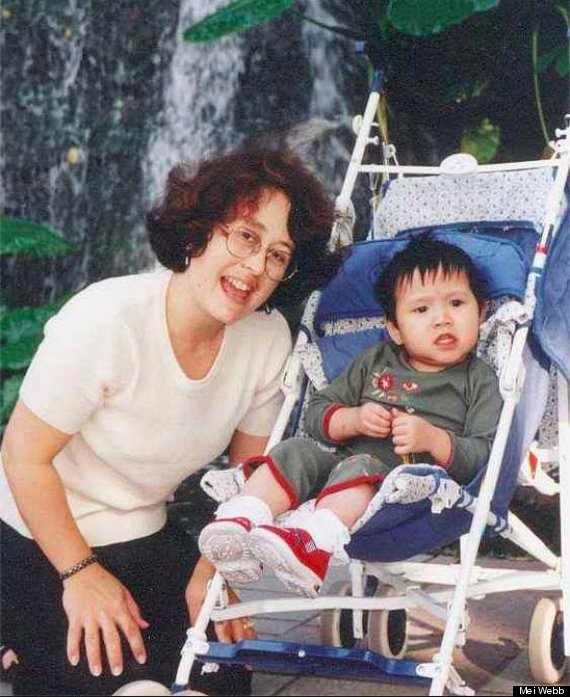Do you ever just wonder to yourself... who am I?
Up until about 3 years ago, I never really questioned my identity but now I am far more aware of it. I guess I have traveling to thank for that. Sometimes I'll say really crazy things like "arghh I look so Asian," or "I wonder what I'd look like with blonde hair," and I'd receive a chuckle or two from my father. I guess growing up, with Western parents and living in a fairly Western society, has made me feel rather "Western." However, my mother thought that it was still important for me to stay connected to my "roots."
What do I mean by that? Our family would go on various trips to China, sightseeing and learning more about the culture. I would religiously attend Saturday Chinese (language) school and whenever my school did a culture/international day, my mother would encourage me do dress up in Chinese dress or bring Chinese food. The key word: encouraged. Not forced.

Understanding my native culture and heritage and knowing other children just like me (that is, my age, adopted in China etc.) were obviously important ideals my mother valued when it came to bringing up her two Chinese daughters. I have never really had any identity issues, however I found that now I have become less interested in maintaining a strong link to my Chinese heritage. This is because I started traveling and seeing more of the world, grew up in a very Western lifestyle and I stopped learning Chinese. I hung out with Western kids and I kind of started to feel more and more "un-Asian," if that's a thing.
What do I mean by this? I have started to become more aware of their customs (the way they eat, walk, talk, behave in public) and I started feeling bored with learning Chinese and going on trips to China. But do not think I did not appreciate the opportunity I had to learn about my culture; I will never truly stop being Chinese, but as I grow older, I feel more and more inclined to declare myself a full-and-through Australian (but that is another matter).
I am on a Chinese Adoption Facebook group and whilst pondering over what to blog about next, I decided to ask for some points of views on the importance of parents immersing their adopted children into their native culture/heritage and allowing them the experience to understand and connect to where they came from etc. and how they felt about being open to learning of their native culture/heritage.
Here are seven (excellent) responses I received:
Julia from California:
I think they are trying to do right thing by exposing their children or child at a young age to their native culture but to be completely honest I never really had that much of an interest when I was younger. I regret it now but now that I am older, I feel like I want to learn more rather than being dragged to Chinese school when really I had no passion for learning about my background. I think it is important though for parents to give their kids a chance to learn about their heritage but when they are older and can retain and understand more of what they are learning about.
Carina from Pennsylvania:
I feel it is important for the child. That they see people who look like them and understand who they are. Although, the parent should not push it. Every child is different. Every story is different. It is important to give them all the options and then if they don't want to go through with it, then that's fine too.
Lulu from Massachusetts:
It is beneficial for children to be exposed to their native culture early because they need to be aware of their origins in order to appreciate the place they came from. I can't speak for everyone but knowing my background at a young age allowed me to be multicultural. Of course I am sure that most (adopted) children want to understand where they are from. It especially helps when parents are supportive and don't keep us in the dark about our past. We should all honor and acknowledged our origins.
Teviah from Ontario:
I think it's good for parents to maybe not overwhelm their child with their heritage, but teach them some basic things and give them the opportunity to learn more if they want. I also think it's important for parents to expose their children to their heritage/culture etc. and give them the chance if they want. Many people grow up to be very active in their native culture, but many choose not to, and both are okay. As long as the child has the chance, from the very beginning.
Juju From Hawaii:
For me it was a great thing because I didn't feel like I had an identity crisis. My mom immersing me with my native culture was very beneficial to me because I got to experience and understand my native heritage and didn't feel lost about where I came from. Some kids may react differently since the line between their birth mom and adopted mom may be more blurred and confusing but overall I think immersing the child with their native culture is a definitely a plus and when their young it's easier for them to accept and adapt.
Yes, definitely because without the push and opportunity to learn about that child's native heritage they may feel out of place and feel confused about their identity. My mom has always immersed me in various Chinese programs ranging from learning the Chinese language and just visiting China in general. I'm glad she did so because now I sort of understand my foundation and heritage which helps me somewhat understand what my cultural identity is. When people ask me what I am always say Chinese because even though I was raised in America and in a white family I still identify with my heritage and native culture because I've visited China so much and have been given the free range of knowing more about where I was born and adopted from.
Yuan from Switzerland:
It's my personal opinion but I would say that yes, it is important. It's our heritage, our past and our second story. The beginning of my life was in another country and that is something I will never forget. That's a part of our lives. Plus, many adopted children want to come back to their native country (like we did in 2011). It shows an obvious interest for the country, so why not begin to learn our culture as a child?
Courtney from Ohio:
Honestly, I believe that question depends on two key words: self-acceptance and communication. The door for having that ability to learn about oneself should always be open, whether it is actually walked through or not. Some adoptees may simply inquire, others will go forth to discover and the rest might not have any sort of interest. I think that is where self-acceptance and communication play a key role. All in all, I feel it's important for parents to let their adopted children know they have the chance to explore their roots, their culture.
My opinion?
I feel that it is very important for parents to expose [their] adopted child/ren to their native culture and heritage at the young and impressionable ages. Opening up this chance to understand and connect with their origins and culture is a huge part in forming and shaping the child's identity. Additionally, having friends who have been through similar situations is very important. Forming these kinds of friendships at young ages allow the children to develop and become comfortable with other kids "just like them." For me, I made friends (who went through similar things I did) at both a young age and later (when I was about 13 years-old) and honestly, I am still friends with all of them -- these kinds of friends will be life long ones.
